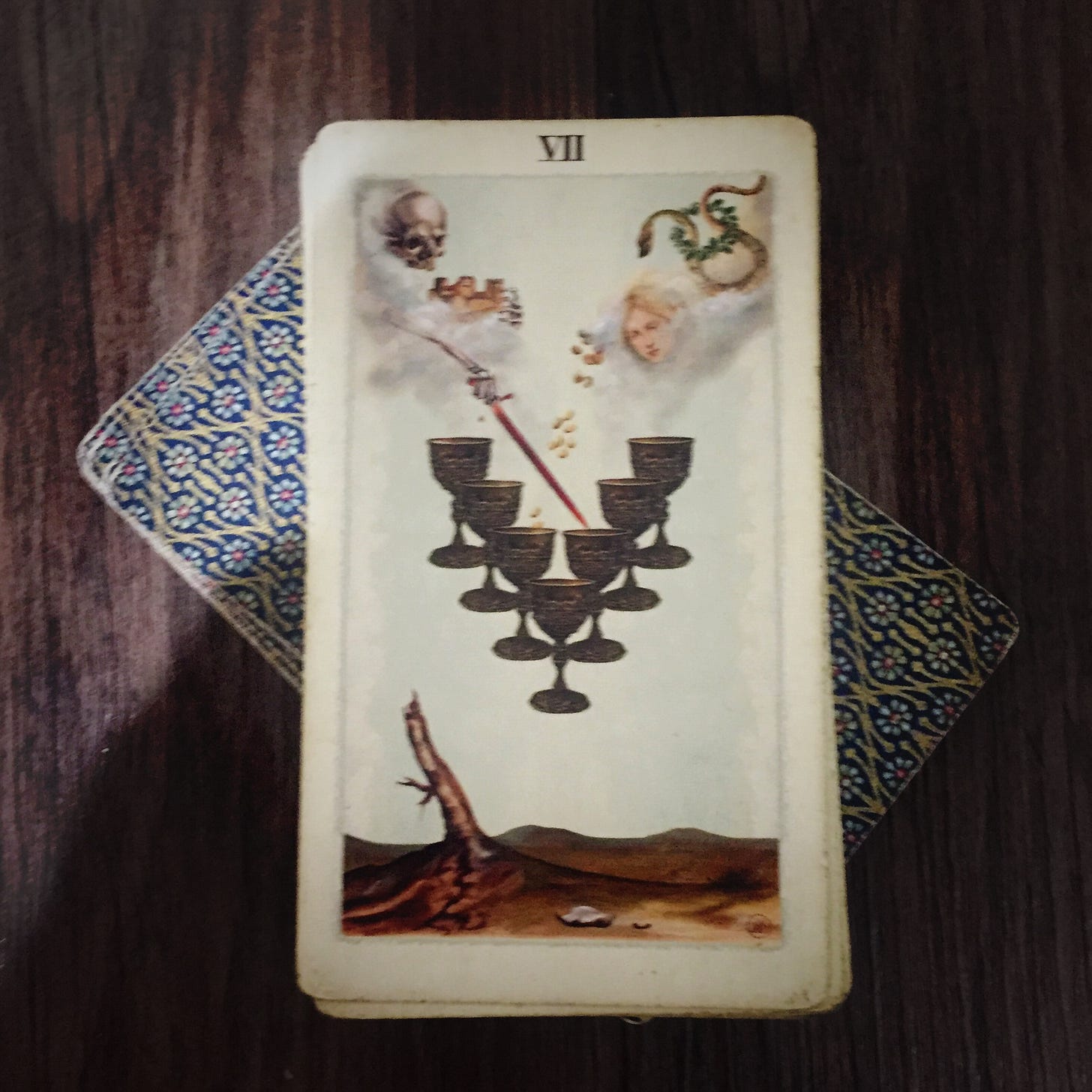MISSIVE 40
The Seven of Cups with Respect to 2021
Our last four years were the most American four years imaginable. A caricature of a grifter became president, and remained mostly absent, save for one declaration: that epistemology was dead. All was false, but hey, there’s some truth in everything, and that became the new compass of the age. There’s some truth in everything. From his election onward, the headlines belonged strictly to hucksters and cheats, and their crimes were rewarded with book deals and blue checks. It crescendoed as hundreds of thousands of Americans died in a pandemic that they could choose to believe whether or not was real.
Most could see through the majority of this bullshit, as it tended to be absurd on face, but everyone got taken in by at least one grift over the course of this saga, even if only for a minute. It was a mirror maze of possibilities: sources familiar with the issue are further away than they appear. If you don’t think at least one, let alone several people managed to hustle you during this period, you might want to check your pockets.
At a certain point, an invisible horror seized control of the air, so terrible that many chose to believe it was an engineered weapon: a disaster that seemed hellbent on exploiting the best possible conditions for its murderous propagation. And those same people helped to create those conditions. It is staggering to realize that SARS-CoV-2’s evolution selected on this: the sociological reality of the United States during this precise window that was optimal for its growth, a time when even the most basic germ theory might be rejected in lieu of fear of Chinese cell phone towers. There was no worse possible enemy to face than this particular virus at this particular time: one that could exist outside of phenomenology for just long enough to spread to the next host. And by chance, it managed to exacerbate those conditions: forcing everyone indoors for just long enough, but also not quite long enough, so that all truth would be filtered through their decisions of what media to consume about what the hell was going on.
All anyone had during the lockdown were their convictions: who they were when nothing was real. What they would be certain of in a vacuum of material existence. And that’s why I feel the card to reflect on, right now, is the Seven of Cups:
This is a minor that doesn’t get a lot of attention or care, despite its fascinating art. Dismissed as the card of illusion, it is often read as getting tricked, dealing with options that are good to be true, and so on and so forth. But the most interesting thing about the Seven of Cups is that it is not a Sword, the suit that is dedicated to humanity’s intellectual folly. It is not even the Seven of Swords, the card of being tricked due to poor intellectual foundations, and having them used against us. It is a Cup, the suit of emotions and relations to others: what pours fluidly between human beings. In the Thoth tradition, it is the card of Venus in Scorpio: what our hearts will pursue regardless of the consequences of those pursuits.
The Seven of Cups is the failure to achieve consensus reality- believing what we want to believe and doing as we please. It is desire in full disconnection from others that can rein it in, the unexamined inner life superseding the outer. It is not failure by using the wrong intellectual model, but by simply letting go of the steering wheel.
In an age of being thralls to such forces, I’m going to let myself be a thrall for just a moment, because today was a good day. Biden, during his inauguration speech, noted:
“Many centuries ago, Saint Augustine, a saint in my church, wrote that a people was a multitude defined by the common objects of their love.”
And I think about the trinkets offered in the Seven of Cups, and how meaningless they all are at the end of the day. Which is the common object of our love? Who is we here?
“What are the common objects we as Americans love that define us as Americans? I think we know: opportunity, security, liberty, dignity, respect, honor and yes, the truth.
And there we have them, exactly seven lofty cups suspended in the clouds, some even synonyms of others. And that’s when we realize, the card offers only things that only other suits can provide. Who are the Americans being talked about here, searching for that common object? Why is Justice (XI) excluded here? Perhaps what the illusion omits is the best way to understand what it is meant to draw us away from. What you need most at this point is likely not on that list.
For Indiana Jones, it was not one of the glorious and ornate cups that called out, but the most mundane among the panoply of potential Grails. Only one spoke to the material reality of the Last Supper.
Only the Eight of Cups, the offer of moving on past the possibility of the Seven, can break the spell. Don’t be enthralled. Who you share a common object of love with is for you and you alone to know and declare.

